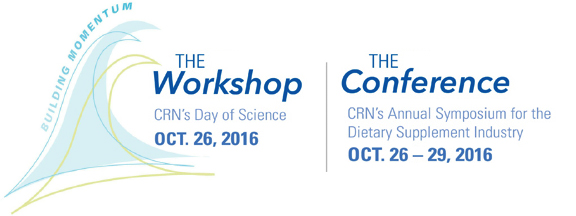
WORKSHOP | CONFERENCE
CRN events celebrate the association and industry’s ‘building momentum’
A record number of dietary supplement and functional food company executives convened last week in Dana Point, California, for The Conference, CRN’s annual symposium. The theme, “Building Momentum,” captured the atmosphere of the event as initiatives that not so long ago were nascent ideas are now gaining traction and demonstrating success—from revealing the new Supplement OWL registry to a sneak peak at CRN’s new website and a preview of a consumer campaign coming in 2017. The event also celebrated CRN’s partnership with the National Advertising Division, now in its tenth year, with more than 270 cases in the books. Attendees heard from FDA Office of Dietary Supplements chief Steven Tave in addition to a diverse slate of business and marketing experts, political pundits, and of course, the CRN staff. Just prior to The Conference, CRN’s “day of science,” The Workshop, also drew an unprecedented number of participants. Check out this special CRN Events Supplement to review highlights, or see what you missed!
CRN conference focuses on that most important person: the consumer
Consumers are looking for leadership
It’s a time of great opportunity for dietary supplement and functional food companies as we find ourselves in the midst of the “Wellth Revolution”—marked by a massive shift in health and wellbeing, creating new lifestyle desires, focuses, behaviors and allies, John Gerzema, best-selling author and social trends/data analyst, told attendees during his kick-off presentation at The Conference. Mr. Gerzema, in his presentation on consumer trends and how technology is reshaping the shopping experience, shared examples of health as a luxury brand, noting, “Luxury not is not about objects, it’s about making a statement that you are a premium person living a premium lifestyle,” advising that smart companies will frame product benefits in the context of these aspirations. “Research reveals that businesses are being called on by consumers to lead society forward,” he explained, citing a current state of “leadership malaise” following the 2008 financial crisis and noting a particular lack of trust when it comes to foods. “Yet people are turning to food as medicine,” he said. Mr. Gerzema emphasized that consumerism has turned inward to what’s authentic and noted that businesses today must be “purpose first.” Leadership comes from shaping culture while serving society, he observed, and advised, “put your values out there.”
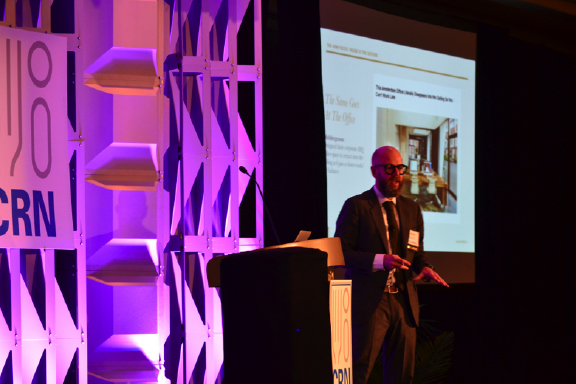
John Gerzema kicks off conference sessions with a deep dive into consumer trends
Innovation is driving growth
Weight control, probiotics and nutritional bars are driving growth in the dietary supplement/functional food marketplace, with innovative, consumer-focused positioning, claims and products contributing, as well, according to Bob Sanders, executive vice president, Healthcare and Nutritional Supplement practice leader, IRi. Mr. Sanders delivered a data-packed presentation, emphasizing the prevalence of dietary supplements in today’s households and declaring, “self-care behavior will become even more pervasive with rising health care costs, which bodes well for supplements.”

Bob Sanders, of IRi, delivers a data-packed discussion of the state of the supplement marketplace
Opportunities to educate, enhance experience across three channels
A health-food store, an online giant and a traditional chain drug/grocery—speakers in the “Three Channels/Three Consumers” session brought to life their respective customers’ journey toward purchasing, each with their own priorities and with opportunities for the supplement/functional food industry to enhance the customer experience. Alan Lewis, director, government affairs and food and agriculture policy, Natural Grocers by Vitamin Cottage, emphasized the personal approach members of the retail team take with their customers in answering questions and helping to keep them on track with their supplement regimens. Raj Sapru, director of strategy, NetRush, a company that works closely with Amazon, noted that the online shopping experience often doubles as an educational platform, as well, resulting sometimes even in consumers going to a traditional brick-and-mortar store to make their purchase after online research. Nat Love, chief operating officer, NJL Consulting Services, and former Meijer executive, noted that 20 percent of shoppers use their phones while shopping in brick-and-mortar stores and observed that the Supplement OWL product registry will have a lot of power to move forward consumer knowledge. The experts’ commentary illustrated a robust marketplace where channels intersect to provide consumers an array of purchasing pathways. As Mr. Sapru observed, we’re operating in an active “ecosystem” comprised of many channels for the same consumer, with a shared future requiring service that is “fast, personalized and accurate.”

Alan Lewis, Raj, Sapru and Nat Love shared insights in the Three Channels/Three Consumers panel
The future happens very slowly over time, then all at once—and consumers are already there
Think new revenue models over campaigns, Mitch Joel, one of the world's leading experts on new media and emerging technologies advised during the closing day-one session. Mr. Joel led an exciting thrill ride touching on the latest digital marketing strategies to help drive business growth in a mobile world. “The best marketing is so good, people will pay for it,” he observed, citing fun examples of companies doing just that, a 2015 Mondelez project where shoppers were able to design and purchase custom packages of Oreo cookies via the web. “In the old world, you devoted 30 percent of your time to building a great service and 70 percent shouting to the world about it, in the new world, that inverts,” he observed.
“Customers themselves have been transformed,” Mr. Joel explained, “they’re moving through technology so quickly and fluidly,” and companies must be agile enough to move with them. Image-based communications wins the day, and “mobile-first” is the way to go, he advised. “You’ve also go to make it social, meaning whatever content you create, the hooks are in so whoever sees it can share it,” he said. Sprinting through case studies of clever marketers tapping into platforms like Instagram for e-commerce and meeting consumers’ embrace of impermanence via Snapchat, Mr. Joel emphasized that “it’s the little things that create big changes,” and encouraged marketers to not only think about what their customers bought, “but their journey toward you.”

Mitch Joel talks digital marketing
CRN survey shows consumer use of supplements on the rise
In addition to these consumer-focused sessions, CRN’s Nancy Weindruch presented data from the association’s 2016 Consumer Survey on Dietary Supplements. Seventy-one percent of U.S. adults—more than 170 million—take dietary supplements, according to the survey, conducted by Ipsos Public Affairs on behalf of CRN The 2016 CRN Consumer Survey on Dietary Supplements found that the five most popular supplements are the multivitamin, vitamin D, vitamin C, calcium and vitamin B/B complex. Contributing to the boost in overall usage is general population growth, as well as the increase in usage among adults between the ages of 18–34. Read more in CRN’s press release.
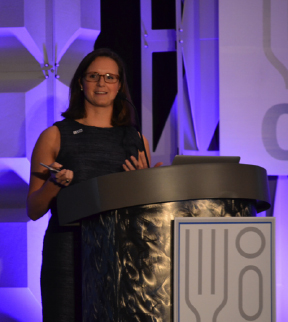
CRN’s Nancy Weindruch gives a topline report on data from the association’s annual Consumer Survey on Dietary Supplements
FDA’s Steven Tave shares ODSP perspectives and priorities
“We prioritize our efforts on what protects consumers—the fact that we’re not doing something speaks to that,” Steven Tave, acting director of the Office of Dietary Supplement Programs (ODSP) explained during his address at The Conference. Encouraged by the support the newly-formed office has received from top-level leadership at the agency, Mr. Tave expressed a positive outlook on what the future holds in terms of more effectively regulating the dietary supplement industry. “With the creation of the ODSP, supplement oversight has a real seat at the table, with better access to leadership,” he noted. Mr. Tave acknowledged the supportive response CRN gave to the recently-re-released draft guidance on New Dietary Ingredient Notifications (NDIs), highlighting the association’s leadership and expressing gratitude for its flexibility and willingness for collaboration and discourse. He noted the extension of the comment period and advised the agency will consider all comments, and especially helpful are those on master files, when abbreviated submissions might be appropriate, and quality/integrity vis-à-vis good manufacturing practices (GMPs). Concerning GMPs and industry compliance, Mr. Tave suggested there is a sizeable portion of companies who want to comply but doesn’t know how and applauded CRN’s education efforts. He worried that these efforts may not be enough to “clean up the market,” however, and that FDA was looking at new ways to do this. He spoke to the value of informed decision-making for consumers and noted he looked forward to seeing what role the Supplement OWL product registry might play.

From left to right: CRN’s Andrea Wong, Steve Mister, FDA’s Steven Tave, CRN’s Rend Al-Mondhiry and 2016 Conference Chairman, David Campbell, of member company RB
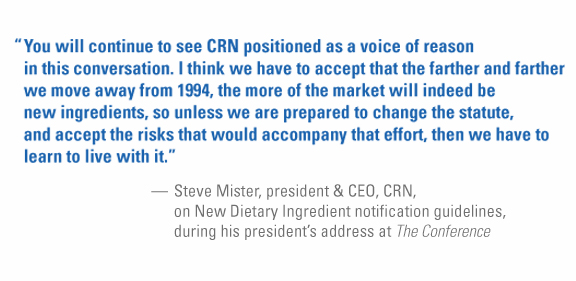
Where regulatory evolution begins: Top industry attorneys envision an updated DSHEA
If you could change anything about the Dietary Supplement Health and Education Act of 1994 (DSHEA) what would it be? CRN tapped 10 legal experts to tackle this question for the “Ten Things I’d Change about DSHEA” session. In six minutes or less, each attorney had to present their case, and a follow-up audience poll on each question provided a unique and thought-provoking experience, sparking ideas on how this 20+ year-old law might evolve to adapt to the modern dietary supplement industry and consumer. Speakers and topics included:
Raqiyyah Pippins, Arnold & Porter
Should DSHEA be changed to revise the “third party literature” exemption to allow posting of studies and research on manufacturer websites?
Ashish Talati, Amin Talati & Upadhye
Should the definition of a “dietary ingredient” in DSHEA be amended to expressly recognize synthetic ingredients (manufactured compounds that are identical to naturally occurring substances in botanicals)?
Julie Hussey, Perkins Coie
Should the standard for FDA’s approval of a health claim under NLEA be changed for dietary supplements from “significant scientific agreement” to a “substantial scientific evidence” threshold when that research is considered in the context of all available scientific research?
Jim Prochnow, Greenberg Traurig
Should DSHEA be changed to remove or substantially revise the prohibition on marketing a dietary ingredient if the substance was previously subject to “substantial clinical investigation” as a drug?
Holly Bayne, Law Office of Bayne and Associates
Should DSHEA be changed to create an herbal (phyto-) medicines category, distinct from herbal and botanical dietary supplement ingredients, provided that certain regulatory criteria are met?
Wade Ackerman, Covington & Burling
Should DSHEA be amended to provide FDA with additional enforcement authority to allow it to seek misdemeanors against firms and their executives that repeatedly violate the GMPs for dietary supplements?
Katie Bond, Kelley Drye & Warren
Should DSHEA be revised to expressly harmonize the DSHEA substantiation requirement and the substantiation requirements under Sections 5 and 12 of the FTCA–effectively codifying the court’s decision in US v. Bayer?
Ivan Wasserman, Amin Talati & Upadhye
Should DSHEA be changed to rewrite the required language of the disclaimers on dietary supplement labels that make structure/ function claims?
Kevin Rising, Barnes & Thornburg
Should the NDI provision of DSHEA be revised to make explicit in the statute when an ingredient “present in the food supply” has been “chemically altered,” and when a manufacturing change in an existing ingredient is substantial enough to create a new dietary ingredient?
Todd Harrison, Venable
Should DSHEA be changed to move the grandfathered date in the definition of a “new dietary ingredient” forward from October 15, 1994 to August 11, 2016 – the date the revised NDI guidance was issued?
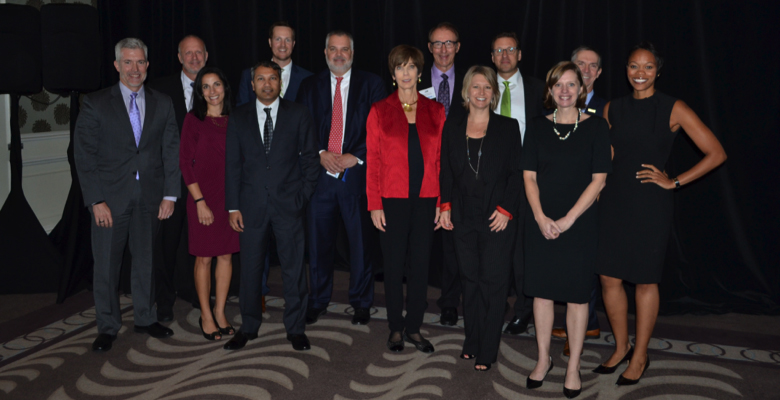
From left to right: 2016 Conference Chairman, David Campbell, of member company RB; Todd Harrison, Venable, LLP; Rend Al-Mondhiry, CRN; Ashish Talati, Amin Talati & Upadhye; Wade Ackerman, Covington & Burling; Kevin Rising, Barnes & Thornburg; Holly Bayne, Law Offices of Bayne & Associates; Jim Prochnow, Greenberg Traurig; Julie Hussey, Perkins Coie; Ivan Wasserman, Amin Talati & Upadhye; Katie Bond, Kelly, Drye & Warren; Steve Mister, CRN; and Raqiyyah Pippins, Arnold & Porter.
 
Views on 2016 election not politics-as-usual at The Conference
Bringing her signature charm, elegance and civility to political discussion, renowned presidential historian Doris Kearns Goodwin, Ph.D., held attendees at the Saturday morning “Breakfast With…” session enthralled as she spun stories connecting touch points throughout America’s past. From illustrative anecdotes of the earnestness and depth of Abraham Lincoln and his impact on President Obama, to tales of how the seasoned press would help protect Franklin Roosevelt’s image (downplaying his paraplegia) in contrast to today’s “gotcha” journalism constantly on the lookout for petty failings, Dr. Goodwin’s storytelling held the audience rapt. In addition, she shared insights from her days as a White House Fellow during the Lyndon B. Johnson administration. Earlier in The Conference schedule, Charlie Cook, editor and publisher of the Cook Political Report and columnist for the National Journal, shared his political perspectives from Washington—including his prediction that Secretary Hillary Clinton will win the presidency but that Republicans will hold their majority in the House of Representatives.

Charlie Cook with CRN Government Relations Committee Chair Kristen Blanchard, of Nutramax Laboratories
Different is better than better
“It’s good to be better, but it’s better to be different,” Sally Hogshead, New York Times best-selling author and world-class branding expert stated, sharing details of how her Fascination Advantage assessment can help both individuals and companies understand how the world sees them and optimize their authenticity to become more influential, more persuasive, and more successful. Check out Ms. Hogshead’s website for more: www.howtofascinate.com.
CRN staff members highlight key association initiatives
Supplement OWL
By now, you’ve probably heard the buzz around the Supplement OWL product registry—open for companies to submit product labels as of Nov. 1. At The Conference CRN’s Duffy MacKay and executives from UL, the global independent safety science company who is developing and administering the Supplement OWL, shared the history of the project and provided a live demo of how the registry works. Read more about the Supplement OWL in CRN’s press release.
New website to launch November 30
CRN’s Judy Blatman and Tracy Betts, CEO of Balance Interactive, the firm chosen for the association’s website redesign project, gave attendees a sneak peek at the new site design and unveiled new features to look for, including: responsive design for easier viewing on mobile devices; an updated and streamlined look that reflects the transparency and organization of the responsible supplement and functional food industry; and more personalized content for CRN members. Look for the new site at the end of this month!
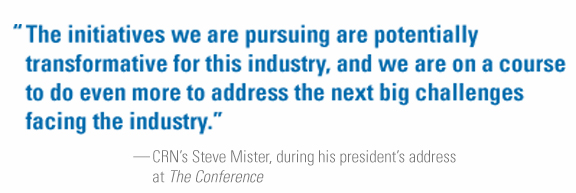
NAD: Ten years of self-regulatory success
CRN’s Rend Al-Mondhiry observed that, since 2006, CRN, through its CRN Foundation, and the National Advertising Division (NAD) of the Council of Better Business Bureaus have worked together to increase monitoring of advertising for dietary supplements—now having brought more than 270 cases. Ms. Al-Mondhiry applauded industry for taking on the responsibility of becoming the “New Sheriff in Town” at the outset of the initiative and encouraged them to continue and “Be a Superhero” and “Stand Up for Truth in Advertising.” Read more in CRN’s press release.
CRN to kick off a consumer-facing campaign
CRN’s Judy Blatman tipped off attendees to an upcoming consumer-facing campaign the association will lead in 2017 to address the issue of safety as it relates to intentional spiking of supplements with drug ingredients. Explaining how a committee of CRN member executives came together to identify the problem and map out strategic considerations, Ms. Blatman noted the campaign would take a two-prong approach and educate on potential interactions/nutrient depletions as well. Look for the campaign launch in April of 2017.
Speaking of 2017…Save the date for next year’s events
October 18–21, 2017 | The Ritz-Carlton, Dove Mountain | Marana, Arizona
Like what you read here? Wish you were there? Next year, do it! Save the date now and plan on attending CRN’s 2017 events. Details coming in 2017 to www.crnusa.org/2017events.

CRN's 'Day of Science' draws record number of attendees
The Workshop: CRN’s Day of Science had its largest audience this year, drawing more than 175 attendees. A range of cutting-edge topics filled the agenda, ranging from ingredient-specific research to integration of dietary supplements into health care.
The microbiome is a hot topic right now and in the first Workshop session, attendees learned how diet can play a larger role than genetics in altering the fecal microbiome composition. Dr. David Suskind, M.D., director of Clinical Gastroenterology, Seattle Children’s Hospital and professor of Pediatrics, University of Washington, kicked off the agenda with a discussion of the fecal microbiome, barrier function, and immune system. In addition, he explored the effectiveness of some dietary therapies on inflammatory bowel disease.
Dietary supplements help promote mental wellness as well as physical wellness and Peter Bongiorno, N.D., co-director, InnerSource Natural Health and Acupuncture, PC, outlined seven ways in which dietary supplements can be used in mental health care, including the support of neurotransmitter production and function, and to aid in weaning off medication.
A comprehensive review of data pertaining to the safety of EGCG, encompassing animal data, human intervention studies, and case reports, was provided by Andrew Shao, Ph.D., of Herbalife.
Based on the available human studies, Dr. Shao proposed a tolerable upper intake level of 300 mg EGCG, which is consistent with animal data.
In the afternoon sessions, DeAnn Liska, Ph.D., of Biofortis, gave the audience a rapid-fire summary of 15 important papers and reports in the area of dietary supplement research published in the last year. Topics included trends in dietary supplement use among U.S. adults, cranberry and recurrent urinary tract infections, and the AHRQ omega-3 fatty acid evidence reports.
David Nieman, Dr.PH, FACSM, professor and director, Human Performance Lab, North Carolina Research Campus, Appalachian State University, wrapped up The Workshop with an appraisal of various approaches to weight loss. In addition to surgery, drugs, exercise, diet, and supplements, Dr. Nieman spoke about the importance of non-exercise activity thermogenesis (NEAT), which includes standing, the daily activities of living, fidgeting and moving, in weight loss. He also supported the use of supplements in mediating health conditions associated with obesity and to correct nutrient insufficiencies that may occur during the weight loss process.
Check out just a few shots from The Conference (by CRN’s own Sandy Khouri)—to see more, visit CRN’s Flickr albums:

A great time on the greens at the Pelican Hill Golf Course, for CRN’s Annual Tournament, sponsored by Balchem/Albion

Colleagues connect at ‘The Art of Putting It All Together’ reception, sponsored by Herbalife

Attendees gather before dawn for the popular Kyowa Hakko Fun Run & Walk

Jim Watson, with wife Brenda (left) and colleague Nicola DiViesta (right) at the Simply Elegant reception, sponsored by Watson Inc
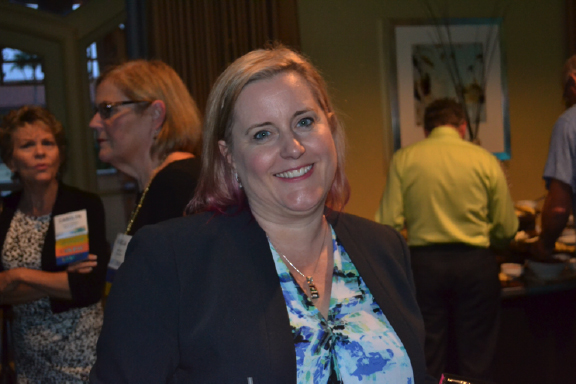
Michelle Stout of Platinum sponsor company Nutrilite/Amway

Carolyn Sabatini of Gold sponsor company Pharmavite, with Marcia Moll, of Gold sponsor company U.S. Pharmacopeial Convention—Bayer HealthCare was also a Gold sponsor of The Conference

John Helfrick and Mark Wright of BASF, sponsor of the Friday evening reception, dinner and entertainment, themed 'The Two-party Party'
|